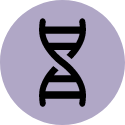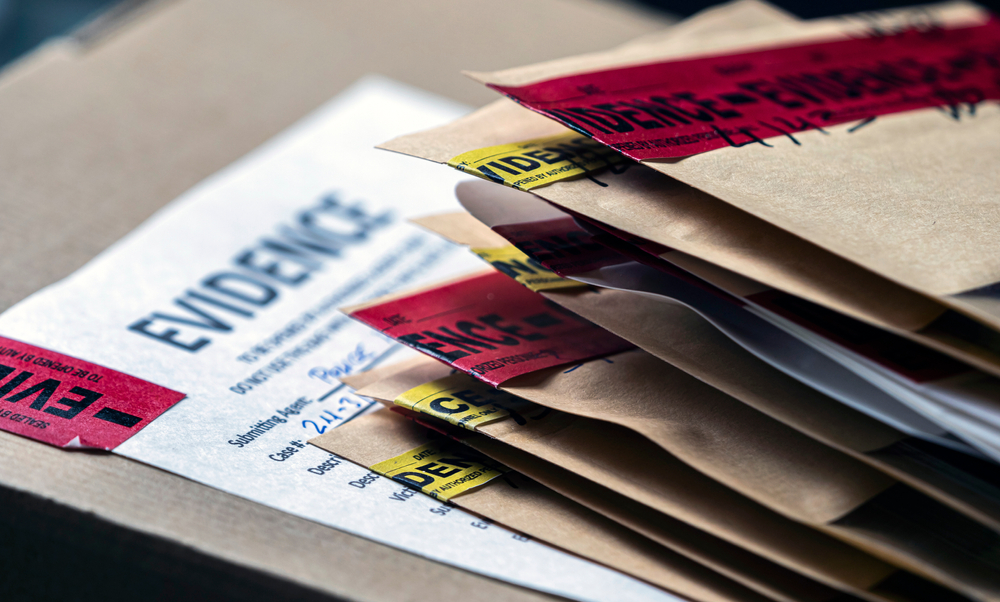
DNA Capacity Enhancement for Backlog Reduction (CEBR) Program
ABOUT CEBR
- ABOUT
- PROGRAM HISTORY
- WHY THIS MATTERS
The DNA Capacity Enhancement for Backlog Reduction (CEBR) Program increases the number of forensic DNA and DNA database samples processed for entry into the Federal Bureau of Investigation’s (FBI’s) Combined DNA Index System (CODIS) by providing funding for laboratories to process DNA samples and to increase their capacity to process DNA samples for CODIS upload. Eligible applicants are states and units of local government with existing crime laboratories or laboratory systems that conduct forensic DNA and/or DNA database sample analysis. Among other things, eligibility for CEBR funding requires government laboratories to be accredited and have access to CODIS.
To learn more about the CEBR Program and potential funding opportunities, please visit DNA Capacity Enhancement for Backlog Reduction (CEBR) Program.
The DNA Identification Act of 1994 authorized the creation of NDIS and provided the first funds for capacity building purposes. The DNA Backlog Elimination Act of 2000 authorized the Department of Justice to provide grants for state and local laboratories to process samples for inclusion in the FBI’s CODIS. In 2004, the DNA Backlog Elimination Act was reauthorized and renamed the “Debbie Smith Act” after sexual assault survivor Debbie Smith. The legislation authorizes funding for eligible public laboratories to (1) process DNA samples for inclusion in CODIS and (2) increase the capacity of laboratories to process DNA samples for inclusion in CODIS.
When the grant program was first offered in 2005, it contained two related components: (1) the Forensic DNA Capacity Enhancement Program and (2) the Forensic DNA Casework Reduction Program. In fiscal year 2007, the two programs were combined, and in fiscal year 2011, the Convicted Offender and/or Arrestee DNA Backlog Reduction Program was incorporated into the DNA Backlog Reduction Program. The consolidation of the related programs into one program was designed to make it easier for grantees to use federal funds to fulfill their individual needs. The program has since been named the “DNA Capacity Enhancement for Backlog Reduction Program.”
By providing funding to assist laboratories with processing DNA samples for entry into CODIS, the CEBR Program facilitates evidence-based criminal justice decisions and responses. With increases in capacity to process more DNA samples for entry into CODIS, CEBR-funded laboratories are able to help law enforcement reduce violent crime, support prosecutors in their efforts to meet their mission, and create safer communities.
As technology advances to improve the analysis of DNA evidence, there is a respective increase in demand for DNA testing. Furthermore, the technology is becoming more complex and costlier, and laboratory budgets struggle to meet the increased demand as identified in DOJ’s 2019 Needs Assessment of Forensic Laboratories and Medical Examiner-Coroner Offices.
Delays in testing evidence result in delays in justice, which can lead to additional victimization by serial offenders or incarceration of the innocent.
Recent performance data from grantees show that CEBR funding is responsible for more than 500 CODIS hits per week. Based on the reported metrics, the CEBR Program has contributed to approximately half of all CODIS hits to date. See the FBI’s CODIS-NDIS Statistics page for more information on CODIS and BJA’s DNA CEBR Grantees page for more information on program accomplishments.
Key Performance Metrics
- More than 1.6 million cases completed
- More than 3.9 million database samples completed
- More than 706,000 forensic (crime scene) profiles uploaded to Combined DNA Index System (CODIS)
- More than 3.7 million databasing profiles uploaded to CODIS
- More than 341,000 CODIS hits
GRANTEES
This map is representative of all CEBR Program awards made since 2020.
If you are interested in viewing more award data, please visit the OJP Award Data webpage.
| GRANTEE NAME | STATE | FISCAL YEAR(S) |
|---|---|---|
| ALASKA DEPARTMENT OF PUBLIC SAFETY | AK | 2020, 2021, 2022, & 2023 |
| ALABAMA DEPARTMENT OF FORENSIC SCIENCES | AL | 2020, 2021, 2022, & 2023 |
| CRIME LABORATORY ARKANSAS | AR | 2020, 2021, 2022, & 2023 |
| ARIZONA DEPARTMENT OF PUBLIC SAFETY | AZ | 2020, 2021, 2022, & 2023 |
| CITY OF MESA | AZ | 2020, 2021, 2022, & 2023 |
| CITY OF PHOENIX | AZ | 2020, 2021, 2022, & 2023 |
| CITY OF SCOTTSDALE | AZ | 2020, 2021, 2022, & 2023 |
| CITY OF TUSCON | AZ | 2020, 2021, 2022, & 2023 |
| CALIFORNIA DEPARTMENT OF JUSTICE | CA | 2020, 2021, 2022, & 2023 |
| CITY & COUNTY OF SAN FRANCISCO | CA | 2020, 2021, 2022, & 2023 |
| CITY OF GLENDALE | CA | 2020, 2021, 2022, & 2023 |
| CITY OF LOS ANGELES | CA | 2020, 2021, 2022, & 2023 |
| CITY OF OAKLAND | CA | 2020, 2021, 2022, & 2023 |
| CITY OF SAN DIEGO | CA | 2020, 2021, 2022, & 2023 |
| COUNTY OF ALAMEDA | CA | 2020, 2021, 2022, & 2023 |
| COUNTY OF CONTRA COSTA | CA | 2020, 2021, 2022, & 2023 |
| COUNTY OF FRESNO CALIFORNIA | CA | 2020, 2021, 2022, & 2023 |
| COUNTY OF KERN | CA | 2020, 2021, 2022, & 2023 |
| COUNTY OF LOS ANGELES | CA | 2020, 2021, 2022, & 2023 |
| COUNTY OF ORANGE | CA | 2020, 2021, 2022, & 2023 |
| COUNTY OF SACRAMENTO | CA | 2020, 2021, 2022, & 2023 |
| COUNTY OF SAN DIEGO | CA | 2020, 2021, 2022, & 2023 |
| COUNTY OF SAN MATEO | CA | 2020, 2021, 2022, & 2023 |
| COUNTY OF SANTA CLARA | CA | 2020, 2021, 2022, & 2023 |
| COUNTY OF VENTURA | CA | 2020, 2021, 2022, & 2023 |
| SAN BERNARDINO COUNTY SHERIFFS DEPARTMENT | CA | 2020, 2021, 2022, & 2023 |
| CITY & COUNTY OF DENVER | CO | 2020, 2021, 2022, & 2023 |
| CITY OF AURORA | CO | 2020, 2021, 2022, & 2023 |
| COLORADO SPRINGS CITY GOVERNMENT | CO | 2020, 2021, 2022, & 2023 |
| COUNTY OF JEFFERSON | CO | 2020, 2021, 2022, & 2023 |
| STATE OF COLORADO, DEPARTMENT OF PUBLIC SAFETY, COLORADO BUREAU OF INVESTIGATION | CO | 2020, 2021, 2022, & 2023 |
| DEPARTMENT OF EMERGENCY SERVICES AND PUBLIC PROTECTION | CT | 2020, 2021, 2022, & 2023 |
| DISTRICT OF COLUMBIA DEPARTMENT OF FORENSIC SCIENCES | DC | 2020, 2021, 2022, & 2023 |
| DEPARTMENT OF SAFETY AND HOMELAND SECURITY | DE | 2020, 2021, 2022, & 2023 |
| COUNTY OF BROWARD | FL | 2020, 2021, 2022, & 2023 |
| COUNTY OF MIAMI-DADE | FL | 2020, 2021, 2022, & 2023 |
| COUNTY OF PALM BEACH | FL | 2020, 2021, 2022, & 2023 |
| COUNTY OF PINELLAS | FL | 2020, 2021, 2022, & 2023 |
| COUNTY OF ST LUCIE | FL | 2020, 2021, 2022, & 2023 |
| FLORIDA DEPARTMENT OF LAW ENFORCEMENT | FL | 2020, 2021, 2022, & 2023 |
| GEORGIA BUREAU OF INVESTIGATION | GA | 2020, 2021, 2022, & 2023 |
| CITY & COUNTY OF HONOLULU | HI | 2020, 2021, 2022, & 2023 |
| IOWA DEPARTMENT OF PUBLIC SAFETY | IA | 2020, 2021, 2022, & 2023 |
| IDAHO STATE POLICE | ID | 2020, 2021, 2022, & 2023 |
| COUNTY OF DUPAGE | IL | 2020, 2021, 2022, & 2023 |
| ILLINOIS STATE POLICE | IL | 2020, 2021, 2022, & 2023 |
| NORTHEASTERN ILLINOIS REGIONAL CRIME LABORATORY | IL | 2020, 2021, 2022, & 2023 |
| COUNTY OF MARION | IN | 2020, 2021, 2022, & 2023 |
| INDIANA STATE POLICE | IN | 2020, 2021, 2022, & 2023 |
| COUNTY OF JOHNSON | KS | 2020, 2021, 2022, & 2023 |
| COUNTY OF SEDGWICK | KS | 2020, 2021, 2022, & 2023 |
| EXECUTIVE OFFICE OF KANSAS | KS | 2020, 2021, 2022, & 2023 |
| KENTUCKY DEPARTMENT OF STATE POLICE | KY | 2020, 2021, 2022, & 2023 |
| ACADIANA CRIMINALISTICS LABORATORY | LA | 2020 |
| JEFFERSON PARISH SHERIFF’S OFFICE | LA | 2020 |
| LOUISIANA COMMISSION ON LAW ENFORCEMENT AND ADMINISTRATION OF CRIMINAL JUSTICE | LA | 2021, 2022, & 2023 |
| LOUISIANA DEPARTMENT OF STATE POLICE | LA | 2020 |
| NORTH LOUISIANA CRIMINALISTICS LABORATORY COMMISSION | LA | 2020 |
| PARISH OF CALCASIEU | LA | 2020 |
| ST TAMMANY PARISH CORONER FORENSIC SCIENCE CENTER | LA | 2020 |
| CITY OF BOSTON | MA | 2020, 2021, 2022, & 2023 |
| STATE POLICE DEPARTMENT | MA | 2020, 2021, 2022, & 2023 |
| CITY OF BALTIMORE | MD | 2020, 2021, 2022, & 2023 |
| COUNTY OF ANNE ARUNDEL | MD | 2020, 2021, 2022, & 2023 |
| COUNTY OF BALTIMORE | MD | 2020, 2021, 2022, & 2023 |
| MARYLAND DEPARTMENT OF STATE POLICE | MD | 2020, 2021, 2022, & 2023 |
| MONTGOMERY COUNTY, MARYLAND | MD | 2020, 2021, 2022, & 2023 |
| PRINCE GEORGE’S COUNTY MARYLAND | MD | 2020, 2021, 2022, & 2023 |
| MAINE DEPARTMENT OF PUBLIC SAFETY | ME | 2020, 2021, 2022, & 2023 |
| COUNTY OF OAKLAND | MI | 2020, 2021, 2022, & 2023 |
| MICHIGAN DEPARTMENT OF STATE POLICE | MI | 2020, 2021, 2022, & 2023 |
| COUNTY OF ANOKA | MN | 2020 & 2022 |
| HENNEPIN COUNTY SHERIFF’S OFFICE | MN | 2020, 2021, 2022, & 2023 |
| MINNESOTA DEPARTMENT OF PUBLIC SAFETY | MN | 2020, 2021, 2022, & 2023 |
| CITY OF KANSAS CITY, MISSOURI | MO | 2020, 2021, 2022, & 2023 |
| COUNTY OF SAINT CHARLES | MO | 2020, 2021, 2022, & 2023 |
| COUNTY OF ST LOUIS | MO | 2020, 2021, 2022, & 2023 |
| MISSOURI DEPARTMENT OF PUBLIC SAFETY | MO | 2020, 2021, 2022, & 2023 |
| SAINT LOUIS METROPOLITAN POLICE DEPARTMENT | MO | 2020, 2021, 2022, & 2023 |
| MISSISSIPPI DEPARTMENT OF PUBLIC SAFETY | MS | 2020, 2021, 2022, & 2023 |
| MONTANA DEPARTMENT OF JUSTICE | MT | 2020, 2021, 2022, & 2023 |
| CITY OF CHARLOTTE | NC | 2020, 2021, 2022, & 2023 |
| NORTH CAROLINA DEPARTMENT OF JUSTICE | NC | 2020, 2021, 2022, & 2023 |
| NORTH DAKOTA ATTORNEY GENERAL | ND | 2020, 2021, 2022, & 2023 |
| NEBRASKA STATE PATROL | NE | 2020, 2021, 2022, & 2023 |
| NEW HAMPSHIRE DEPARTMENT OF SAFETY | NH | 2020, 2021, 2022, & 2023 |
| COUNTY OF UNION | NJ | 2020, 2021, 2022, & 2023 |
| NEW JERSEY DEPARTMENT OF LAW & PUBLIC SAFETY | NJ | 2020, 2021, 2022, & 2023 |
| ALBUQUERQUE POLICE DEPARTMENT EVIDENCE UNIT | NM | 2023 |
| CITY OF ALBUQUERQUE | NM | 2020, 2021, & 2022 |
| NEW MEXICO DEPARTMENT OF PUBLIC SAFETY | NM | 2020, 2021, 2022, & 2023 |
| COUNTY OF WASHOE | NV | 2020, 2021, 2022, & 2023 |
| LAS VEGAS METROPOLITAN POLICE DEPARTMENT | NV | 2020, 2021, 2022, & 2023 |
| CITY OF NEW YORK | NY | 2020 |
| COUNTY OF ERIE | NY | 2020, 2021, 2022, & 2023 |
| COUNTY OF MONROE | NY | 2020, 2021, 2022, & 2023 |
| COUNTY OF NASSAU | NY | 2020, 2021, 2022, & 2023 |
| COUNTY OF ONONDAGA | NY | 2020, 2021, 2022, & 2023 |
| COUNTY OF SUFFOLK | NY | 2020, 2021, 2022, & 2023 |
| COUNTY OF WESTCHESTER | NY | 2020, 2021, 2022, & 2023 |
| NEW YORK CITY OFFICE OF THE CHIEF MEDICAL EXAMINER | NY | 2021, 2022, & 2023 |
| NEW YORK STATE POLICE | NY | 2020, 2021, 2022, & 2023 |
| ATTORNEY GENERAL OF OHIO | OH | 2020, 2021, 2022, & 2023 |
| CITY OF COLUMBUS | OH | 2020, 2021, 2022, & 2023 |
| CITY OF MANSFIELD POLICE DEPARTMENT | OH | 2020, 2021, 2022, & 2023 |
| COUNTY OF CUYAHOGA | OH | 2020, 2021, 2022, & 2023 |
| COUNTY OF HAMILTON | OH | 2020, 2021, 2022, & 2023 |
| COUNTY OF LAKE | OH | 2020, 2021, 2022, & 2023 |
| COUNTY OF MONTGOMERY | OH | 2020 & 2021 |
| CITY OF OKLAHOMA CITY | OK | 2020, 2021, 2022, & 2023 |
| CITY OF TULSA | OK | 2020, 2021, 2022, & 2023 |
| OKLAHOMA STATE BUREAU OF INVESTIGATION | OK | 2020, 2021, 2022, & 2023 |
| OREGON DEPARTMENT OF STATE POLICE | OR | 2020, 2021, 2022, & 2023 |
| CITY OF PHILADELPHIA | PA | 2020, 2021, 2022, & 2023 |
| COUNTY OF ALLEGHENY | PA | 2020, 2021, 2022, & 2023 |
| PENNSYLVANIA DEPARTMENT OF STATE POLICE | PA | 2020, 2021, 2022, & 2023 |
| INSTITUTO DE CIENCIAS FORENSES | PR | 2020, 2021, 2022, & 2023 |
| RHODE ISLAND DEPARTMENT OF HEALTH | RI | 2020, 2021, 2022, & 2023 |
| CITY OF ORANGEBURG | SC | 2022 & 2023 |
| COUNTY OF BEAUFORT | SC | 2020 & 2021 |
| COUNTY OF GREENVILLE | SC | 2020, 2021, 2022, & 2023 |
| COUNTY OF RICHLAND | SC | 2020, 2021, 2022, & 2023 |
| COUNTY OF YORK | SC | 2020, 2021, 2022, & 2023 |
| STATE LAW ENFORCEMENT DIVISION | SC | 2020, 2021, 2022, & 2023 |
| ATTORNEY GENERAL’S OFFICE OF SOUTH DAKOTA | SD | 2020, 2021, 2022, & 2023 |
| METROPOLITAN GOVERNMENT OF NASHVILLE & DAVIDSON COUNTY | TN | 2020 & 2021 |
| TENNESSEE BUREAU OF INVESTIGATION | TN | 2020, 2021, 2022, & 2023 |
| CITY OF FORT WORTH | TX | 2020, 2021, 2022, & 2023 |
| COUNTY OF DALLAS | TX | 2021 |
| COUNTY OF HARRIS | TX | 2020, 2021, 2022, & 2023 |
| HOUSTON FORENSIC SCIENCE CENTER, INC | TX | 2020, 2021, 2022, & 2023 |
| TARRANT COUNTY | TX | 2020, 2021, 2022, & 2023 |
| TEXAS DEPARTMENT OF PUBLIC SAFETY | TX | 2020, 2021, 2022, & 2023 |
| UNIVERSITY OF NORTH TEXAS HEALTH SCIENCE CENTER AT FORT WORTH | TX | 2020, 2021, 2022, & 2023 |
| UTAH DEPARTMENT OF PUBLIC SAFETY | UT | 2020, 2021, 2022, & 2023 |
| VIRGINIA DEPARTMENT OF FORENSIC SCIENCE | VA | 2020, 2021, 2022, & 2023 |
| VERMONT DEPARTMENT OF PUBLIC SAFETY | VT | 2020, 2021, 2022, & 2023 |
| WASHINGTON STATE PATROL | WA | 2020, 2021, 2022, & 2023 |
| WISCONSIN DEPARTMENT OF JUSTICE | WI | 2020, 2021, 2022, & 2023 |
| WEST VIRGINIA STATE POLICE | WV | 2020, 2021, 2022, & 2023 |
| ATTORNEY GENERAL OF WYOMING | WY | 2020, 2021, 2022, & 2023 |
RESOURCES
Publications
Multi-Media
Protocols
Research
Additional Information
HIGHLIGHTS AND EVENTS
- HIGHLIGHTS
- EVENTS
Upcoming Events
Past Events
Get timely
FORENSICS TTA PROGRAM updates
The Forensics TTA Team wants to hear from you!
If BJA Forensics Programs funding has played a role in your organization’s success, no matter how small or how large, we would love to hear about it! Please share your achievements with the Forensics TTA Team by clicking the ‘Submit Highlight’ button.







